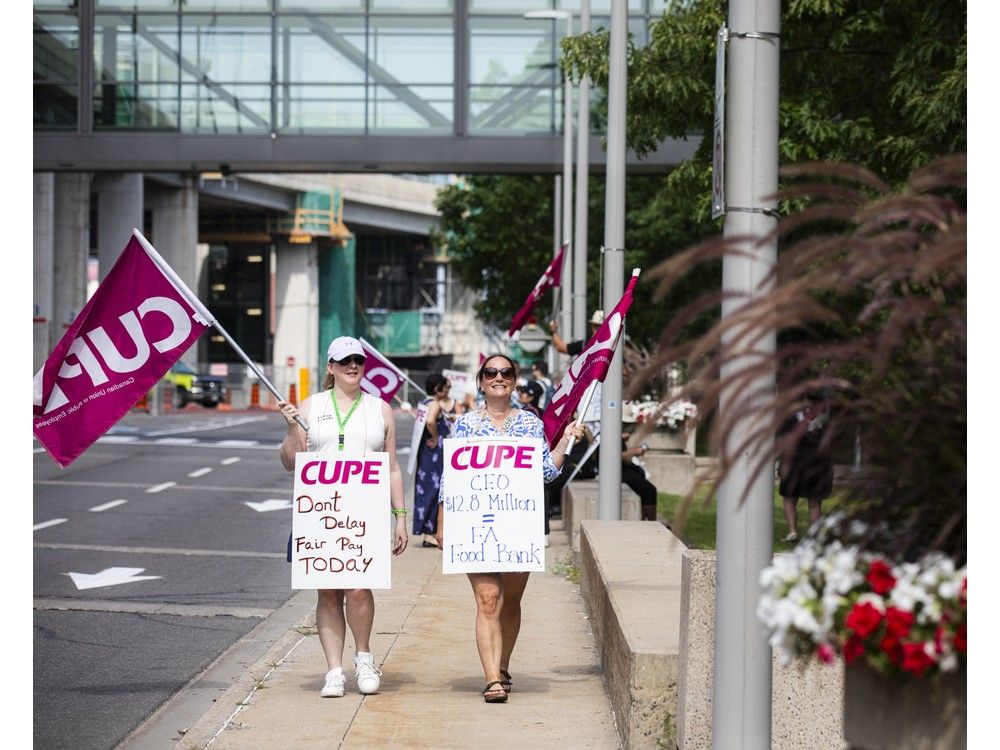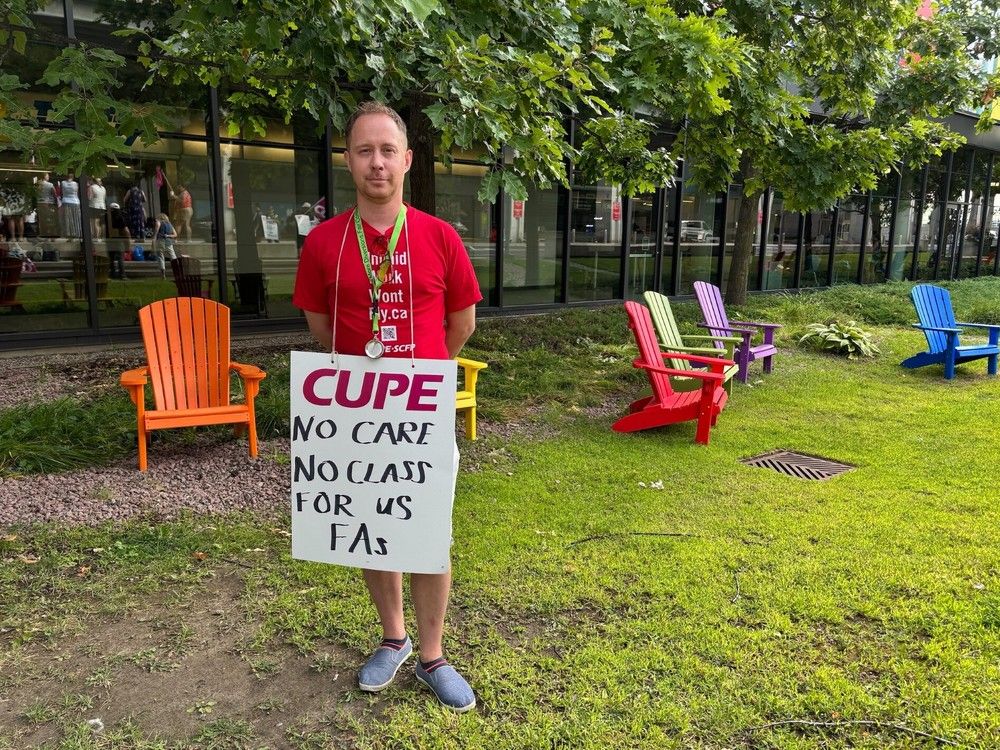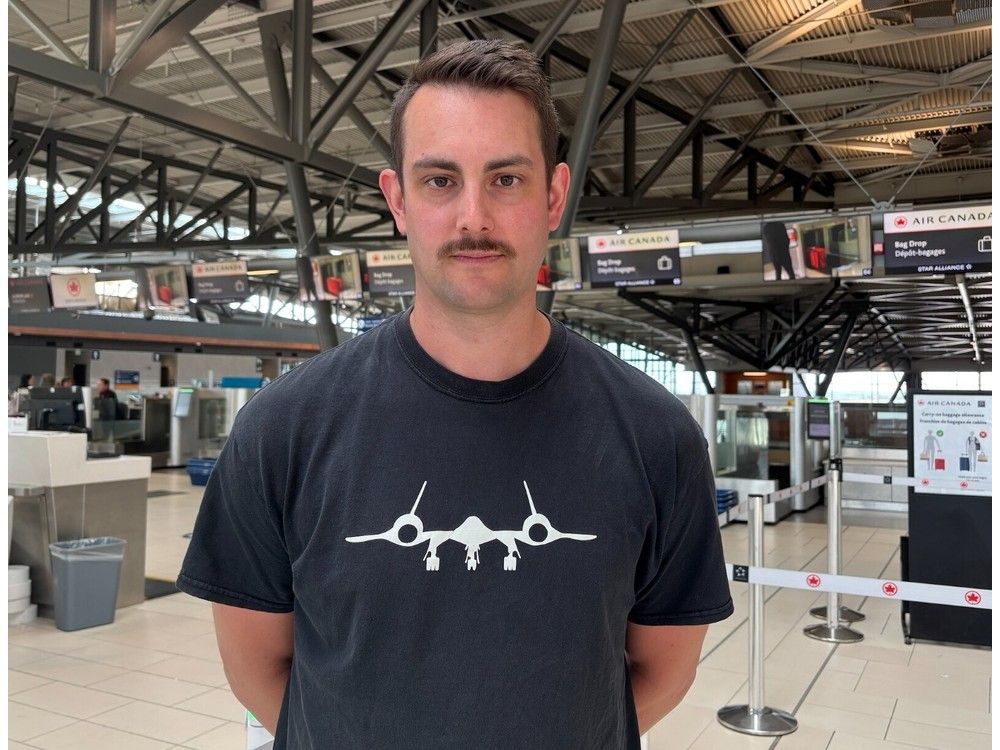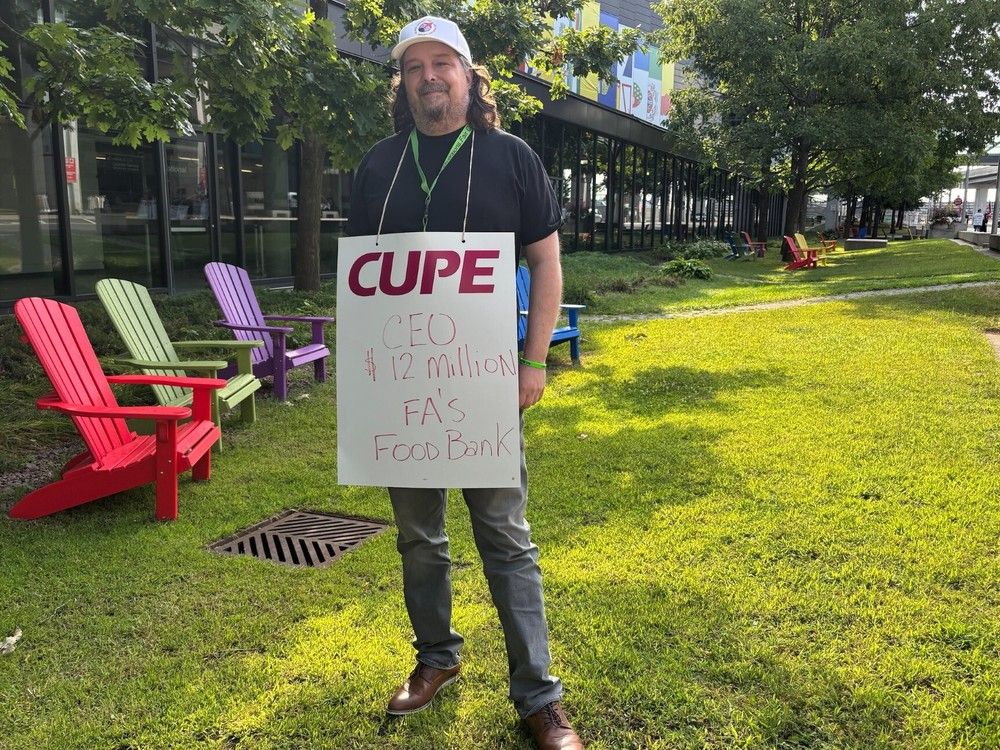
On the first official morning of the
Air Canada flight attendants’ strike
, a group of about 25 picketers were at the arrivals gate at the Ottawa International Airport.
The group waved bright pink Canadian Union of Public Employees (CUPE) flags, with signs around their necks reading slogans like, “UNPAID work won’t FLY!” “I’m in the sky, Pay is on the ground,” and “UnfAir Canada!”
The strike officially began at 12:58 a.m. ET, with picket lines in Montreal, Toronto, Calgary, Richmond, B.C., Halifax, and Winnipeg, the Air Canada component of CUPE announced on Aug. 16.
Air Canada and Air Canada Rouge operations are suspended, impacting about 130,000 people each day, according to the airline. Air Canada Express and Air Canada Jazz flights are not affected.
Philippe Bonneville, vice-president of CUPE Local 4091 representing almost 2,600 Air Canada flight attendants based in Montreal, arrived at the picket line just before 8:45 a.m.
“We want this strike to be as short as possible,” he said. “No one that you see here wants to be here and doing this for fun on a Saturday morning.”
Picketers cheered and waved their flags at cars that drove by, many of them honking their horns.
“We want to work and we want to fly you,” one picketer said to a passenger who cheered en route to the parking garage.
Eric Marchand, another CUPE Local 4091 vice-president, said he’s been a flight attendant for about 30 years.
“I want to make this job what it used to be,” he said. “A career, and not just a summer temporary thing where you’re basically working below minimum wage and you quit after six months to a year.
“I want to get it back to what I had, which is a beautiful career, a very fun job and loving people.”
According to Bonneville, the union’s demands include improved working conditions, like compensation for an average of 35 hours a month of unpaid work. T
hey are also seeking a “decent increase” in wages that cover the cost of living.
“Everyone here wants to be shown respect,” Bonneville said. “I want to be hopeful. We are all proud of the work we do, and we all love our jobs.”

It’s quiet inside the Ottawa airport and away from the picketers outside. Short lines form at check-in desks for other airlines like Porter and WestJet. The Air Canada counter line grew as the morning dragged on.
At 10 a.m., Alvin Garcia sat on an airport bench next to his blue carry-on suitcase and black backpack with a paper Air Canada tag wrapped around the handle.
After spending more than a month in the Philippines, Garcia started his return journey on Friday with connections through Vancouver and Toronto. He received an email on Friday that his final flight to Moncton, N.B., was cancelled, he says, and he bought a new ticket to come to Ottawa as the cheapest alternative to find his way home.
Air Canada refunded Garcia $92 for the cancelled flight, he says. The situation is “a little bit frustrating.”
His Moncton flight, which he says he rebooked with Porter Airlines for $1,000, departs at 8:35 p.m. today. Travelling alone, he will stay at the airport until his evening flight. He has not slept in nearly two days.
Air Canada did not immediately respond to requests for comment on Garcia’s situation.
The ongoing strike is “not worth it,” Garcia said. “Too many suffer from the cancelled flights.”
Just after 11 a.m. and standing in an Air Canada passenger service line, Eric Koch is trying to get his group of 10 travellers home to Vancouver.

The three families spent the last two weeks visiting museums and national sites in the capital.
An Aug. 15 email advised Koch that his group’s Aug. 16 flight home was cancelled.
After three-and-a-half hours on the phone with Air Canada’s customer service, Koch says he was advised to go to the Ottawa airport to try to get rescheduled.
“We were told that we were basically cancelled and we were on our own,” he said.
Koch preemptively spent $3,000 to book the next available Vancouver flight with WestJet for himself, his wife, and his five-year-old and seven-year-old children. The flight doesn’t take off until Aug. 20.
The WestJet flight is his “fallback plan,” he said. “I’m definitely upset that it came to this.”
Of the picketers outside the airport, Koch added that he “appreciates their desire to establish workable working conditions and that they have concerns.”
“But to put other people in a difficult situation doesn’t really engender them to your cause.”
On the picket line, Bonneville says workers “sincerely apologize to all our customers that are being inconvenienced by this.”
“But we believe it’s the only way we’re going to get heard and that the employer will respond to us instead of what we’ve seen over the last few days,” he added.
Of bargaining negotiations at an airport hotel in Toronto, Bonneville said the union submitted a proposal to Air Canada a few days ago, which they “did not receive a response on.”
“We’ve been there and we’ve been waiting.”
The union
rejected
Air Canada’s request to enter
third-party binding arbitration
earlier this week.
“We want a negotiated settlement at the table that both parties agree to,” Bonneville said. “That is what good, well-meaning bargaining means.”
Air Canada did not respond immediately to questions about the status of bargaining or Bonneville’s comments.
For Bonneville, marching on the Ottawa picket line into the morning, the hope is that a deal is reached as soon as possible.
“If we have a deal by this evening, I would be forever grateful … We want to make this as short as possible,” he said. “But at the end of the day, if I had a crystal ball to tell you how Air Canada is going to react, we wouldn’t be here today.”



